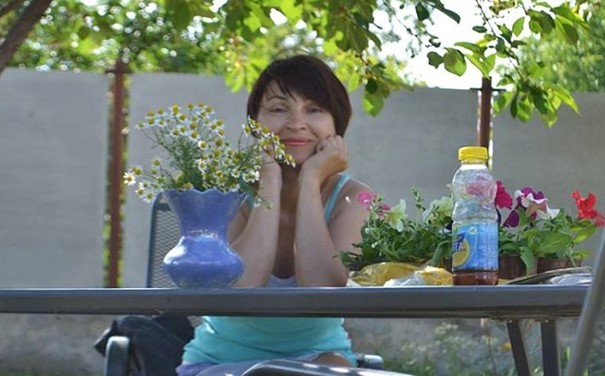Volunteer imprisoned by Donbas militants for helping orphaned children receives Ukraine’s National Human Rights Defender award

Lyudmila Huseinova has become the 2021 laureate of Ukraine’s National Human Rights Defence Award, although it may be some time before she learns of this. The civic volunteer and defender of children’s rights in occupied Novozavovsk has been imprisoned in the self-proclaimed and Russian-controlled ‘Donetsk people’s republic’ [DPR] since October 2019.
Huseinova is the Civic Ombudsperson for Children’s Rights in occupied Donetsk. After the area was seized by militants in 2014, she initiated a national movement to help children living in inhuman conditions in the village of Prymorske which is effectively on the frontline. This involved regularly collecting and organizing the delivery of humanitarian aid for orphaned children and social orphans living at a boarding school / orphanage in Nozoazovsk which the Ukrainian authorities had not had time to evacuate. The militants reportedly dissolved this institution and sent the children away, where possible, to grandparents, etc. A very large number, however, ended up in the effectively frontline Prymorske.
Thanks to Lyudmila and the volunteers she mobilized, the children gained a library of Ukrainian Literature and computer. She also made it possible for each child to receive cards from different parts of Ukraine, so that they would all know that they had not been abandoned and forgotten. That, of course, did not fit the militants’ / Russia’s narrative. Huseinova also stood up for the children’s rights before the so-called ‘DPR local officials’ and ‘police’. She succeeded, for example, in securing the release of several children who had been forcibly place in a psychiatric unit for adults as supposed juvenile offenders. She personally organized getting sanitorium treatment or care for children suffering from illnesses (anaemia, pleurisy) linked with the appalling living conditions.
Although her views are undoubtedly pro-Ukrainian, it seems certain that Lyudmila was seized because of her active human rights work. She was first held for 40 days at the notorious Izolyatsia secret prison in Donetsk where both male and female hostages are savagely tortured. After that, she was transferred to a Donetsk SIZO, or remand prison, where she remains imprisoned to this day. The Zmina Human Rights Centre reports that Lyudmila continues helping people while imprisoned, using her contacts to look for relatives of women held prisoner with her in the hope that the relatives can help file applications for them to be allowed to serve any sentence in government-controlled Ukraine.
The militants this time have not just targeted one woman determined to help children in need. They have also, as journalist Olha Musafirova wrote in April 2020, orphaned the children for a second time.
The award was presented by Ukraine’s Human Rights Ombudsperson Lyudmila Denisova and received on Lyudmila Huseinova’s behalf by her husband, Dmytro Parkhomenko.
Militants of the so-called ‘Donetsk and Luhansk people’s republics’ are known to be holding at least 300 prisoners of war and hostages, although the real figure is very likely to be higher. Many are held in secret prisons, the most notorious of which – Izolyatsia in occupied Donetsk – is described by former inmates as a concentration camp. Although the militants effectively admitted Izolyatsia’s existence a few days ago (details here), both Russia and its proxy ‘Donetsk republic’ formally deny that there are such prisons and prevent the International Red Cross and OSCE Special Monitoring Mission from visiting inmates.
There are known to be 30 women hostages, although once again, the real figure may be much higher. One of the women, Oksana Parshyna was seized in May 2021, when three months pregnant. There is no information about her condition, and that of the baby, however she has not been released. Nor have several women with serious medical conditions: Olena Piekh suffers from epilepsy, while Olena Zaitseva was probably released from Izolyatsia because several occasions of heavy bleeding made the militants fear that she would die under torture. Natalia Statsenko, a doctor from Makiyivka, urgently needed surgery for a chronic spinal condition when she was seized in July 2019, and by now the situation is critical.
The same, it must be said, is true of many of the male hostages, with particular concern over the health of 71-year-old Vitaly Atamanchuk.
The National Human Rights Defence Award was created by the Human Rights Agenda Platform, an informal coalition of major Ukrainian human rights NGOs.





